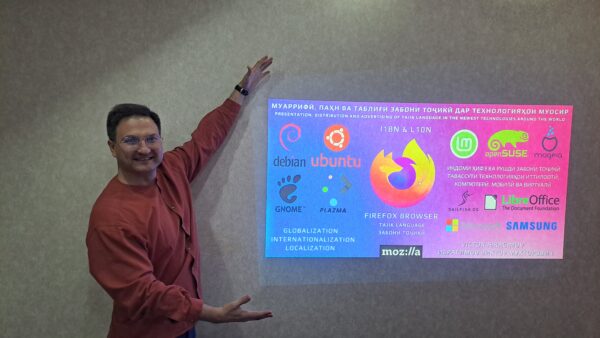Hello World!
My name is Victor Ibragimov, and I am from Dushanbe, Tajikistan (One of Five Central Asia Countries).
On September 3, 2023, I celebrate my third year as a member of the Mozilla community, starting from September 3, 2020!
Q. What first drew you to want to volunteer with Mozilla’s localization program?
I have been volunteering as a professional translator and coordinator of English to Tajik translations for over 20 years. Throughout my career, I have worked on numerous software localization projects, including Debian OS, Ubuntu OS, Fedora OS, openSuse OS, SailfishOS, KDE, Gnome Desktops, and many other fantastic software and platforms.
Around three years ago, I discovered that all these computer operating systems and desktops used Firefox web browser by default. However, I noticed that Firefox did not have Tajik language support. Determined to address this gap, I reached out to the maintainers of these projects. They informed me that Firefox is a separate project and advised me to contact the Mozilla team directly to initiate the localization of Tajik language.
With my extensive experience in translation and coordination, I was determined to contribute to the completion of a high-quality Tajik translation. This commitment was driven by my desire to enhance the usability of Mozilla products for Tajik-speaking users and to foster inclusion in the global tech community.
Q. What have been some of the most rewarding or impactful projects you’ve localized for Mozilla?
Some of the most rewarding and impactful projects I have localized for Mozilla include the translation of Firefox web browser into Tajik language.
Additionally, I have worked on localizing Mozilla’s mobile projects, such as Firefox for Android and Focus for Android. These projects have allowed Tajik-speaking users to have a seamless browsing experience on their mobile devices and maintain their privacy with the Focus app. This has had a positive impact on the accessibility of technology for Tajik-speaking individuals and has empowered them to fully utilize Mozilla’s mobile products.
Overall, these localization projects have been rewarding and impactful as they have contributed to breaking down language barriers, fostering inclusion, and empowering Tajik-speaking users to access and utilize Mozilla’s products effectively across various platforms.
Q. What advice would you give to someone new wanting to get involved in localizing for Mozilla?
1. Start by familiarizing yourself with the Mozilla community and the localization process. Visit the Mozilla website and explore the resources and documentation available for translators. Join relevant forums or mailing lists to connect with other translators and learn from their experiences.
2. Choose a project or software that you are passionate about and that aligns with your language expertise. It could be Firefox, Thunderbird, or any other Mozilla project. By working on something you are interested in, you will stay motivated and enjoy the process of localization.
3. Take advantage of the available tools and resources. Mozilla provides various tools and platforms to facilitate the localization process, such as Pontoon and Transvision. Familiarize yourself with these tools and use them to contribute effectively.
4. Collaborate and communicate with other translators. Localization is a collaborative effort, so it’s important to engage with other translators, ask questions, and seek feedback. Participate in discussions and share your knowledge and experiences with the community.
5. Be proactive and take initiative. Look for opportunities to contribute beyond just translating strings. Offer to review translations, suggest improvements, or help with testing and bug reporting. This will not only enhance your skills but also make you a valuable member of the localization team.
6. Stay updated with the latest developments in your language and the software you are localizing. Attend conferences, workshops, or webinars related to localization or technology to stay informed about new trends and best practices.
7. Seek feedback and continuously improve your translations. Localization is an ongoing process, and there is always room for improvement. Actively seek feedback from users, fellow translators, and project maintainers to refine your translations and ensure they are accurate, clear, and culturally appropriate. Embrace feedback as an opportunity for growth and strive to deliver high-quality localized content.
8. Stay connected with the Mozilla community and stay up to date with changes and updates. Join relevant mailing lists or forums to stay informed about new projects, updates, and announcements. Regularly check the Mozilla website and other official channels for any news or changes that may impact your localization work. By staying connected, you can actively contribute to the community and ensure your translations are up to date with the latest developments.
9. Be patient and persistent. Localization can be challenging at times, especially when dealing with technical terms or complex strings. Don’t get discouraged if you face difficulties initially. Keep practicing, learning, and improving your skills.
10. Lastly, enjoy the process and have fun! Localizing for Mozilla is not just about contributing to a global project, but also about preserving and promoting your language globally. Embrace the opportunity to make a positive impact and connect with your language community.
Remember, whether you are a newcomer or an experienced translator, your contribution to localizing Mozilla projects can have a significant impact. So, take the leap and start making a difference in your language community and beyond.
Q. How has your volunteering impacted users in your language community?
As a Mozilla volunteer, my contributions to Tajik translation have had a significant impact on Mozilla users in the Tajik language community. By ensuring that Firefox web browser is fully localized and accessible in Tajik, I have helped to make it easier for Tajik internet users to navigate and use the browser in their native language. This has not only improved their overall browsing experience but also promoted the importance of using Tajik as a language of technology and digital communication.
Furthermore, by incorporating the new Tajik language reforms into translations, I have played a role in making the Tajik language clearer and more beautiful. This has not only enhanced the user experience for Tajik-speaking Mozilla users but has also contributed to the development and preservation of the language itself.
In addition, my involvement in creating new Internet terminology for the Tajik language has been instrumental in bridging the linguistic gap between technology and the Tajik-speaking community. This has allowed for the development of e-government, e-commerce, and e-education platforms in Tajikistan, as well as empowering Tajik internet users to fully utilize the potential of the internet in their daily lives.
Moreover, the opportunity to create multilingual dictionaries with Tajik language has further enriched the linguistic resources available to Tajik speakers. This has not only facilitated effective communication but has also fostered a sense of pride and ownership over their language.
Interested in featuring in these spotlights? Or know someone you think we should interview? Fill out this form, or reach out directly to delphine at mozilla dot com. Interested in contributing to localization? Head on over here for more details!










No comments yet
Post a comment